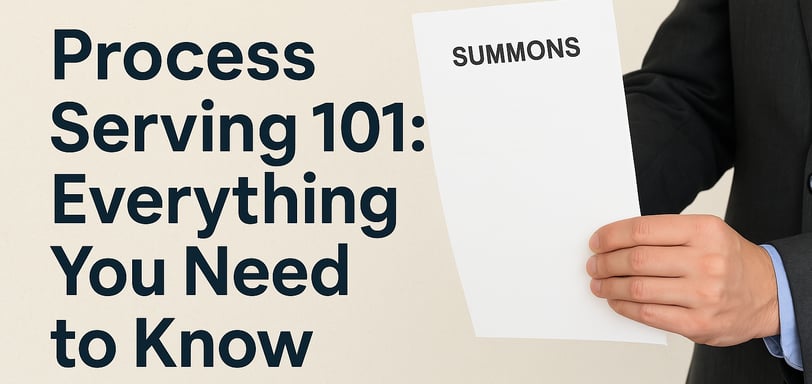Process Serving 101: Everything You Need to Know
Learn the basics of process serving—what it is, how it works, and why it’s essential to the legal system. Perfect for anyone needing a process server or exploring the field.
Chevonne Kieser
4/6/20252 min read


When legal action is initiated, one of the first steps is ensuring that the involved parties are properly notified. That’s where process servers come in. Though often behind the scenes, process servers play a vital role in upholding due process and keeping the legal system running smoothly.
In this post, we’ll break down exactly what process serving is, why it’s important, and how the process works.
What Is Process Serving?
Process serving is the act of delivering legal documents—such as summonses, complaints, subpoenas, or restraining orders—to individuals involved in court proceedings. This ensures that the recipient is properly informed and given a fair chance to respond.
The person who delivers these documents is called a process server. Their job is to locate the individual and serve the documents in accordance with legal requirements.
Why Is Process Serving Important?
Process serving is a critical step in maintaining due process—the legal requirement that an individual must be notified of legal actions taken against them.
Without proper service:
A court case may be delayed or dismissed.
A judgment may be challenged.
The rights of the parties involved may be violated.
Proper process serving ensures transparency, fairness, and legal compliance.
Who Can Be a Process Server?
Laws vary by state, but in general:
Process servers must be at least 18 years old.
They cannot be involved in the case.
Some states require licensing or registration.
Professional process servers are trained to handle difficult situations, locate hard-to-find individuals, and ensure documents are served legally and promptly.
How Does the Process Work?
Here's a general overview of how process serving works:
Receiving Documents: The server receives legal papers from a law firm, court, or private party.
Locating the Recipient: The server identifies the recipient’s address or place of work.
Serving the Documents: The documents are delivered directly to the individual, or in some cases, to someone at their residence or business.
Proof of Service: The process server completes an affidavit or proof of service, which is filed with the court as evidence.
Can Someone Refuse to Be Served?
People can try—but it doesn’t usually work. A process server can’t force someone to accept papers, but if the individual is properly identified and the attempt is documented, the court may consider the service valid.
Some jurisdictions allow alternative service methods, like:
Leaving papers with a responsible adult at the home.
Posting on a door.
Publishing in a newspaper (in rare cases).
Serving by mail or email (with court approval).
How to Hire a Process Server
If you need to serve legal documents, it’s best to hire a professional and reliable process server. Look for someone who:
Understands local and state laws.
Has experience handling different types of cases.
Provides proof of service and status updates.
Has good reviews or referrals.
Final Thoughts
Process servers may not always be in the spotlight, but their role is essential to the justice system. Whether you're filing a lawsuit, responding to one, or just curious about how it all works, understanding the basics of process serving can give you valuable insight into how legal procedures begin.
Need help serving papers? Contact us right away at 786-551-4112 or info@onpointproserve.com to get started.



